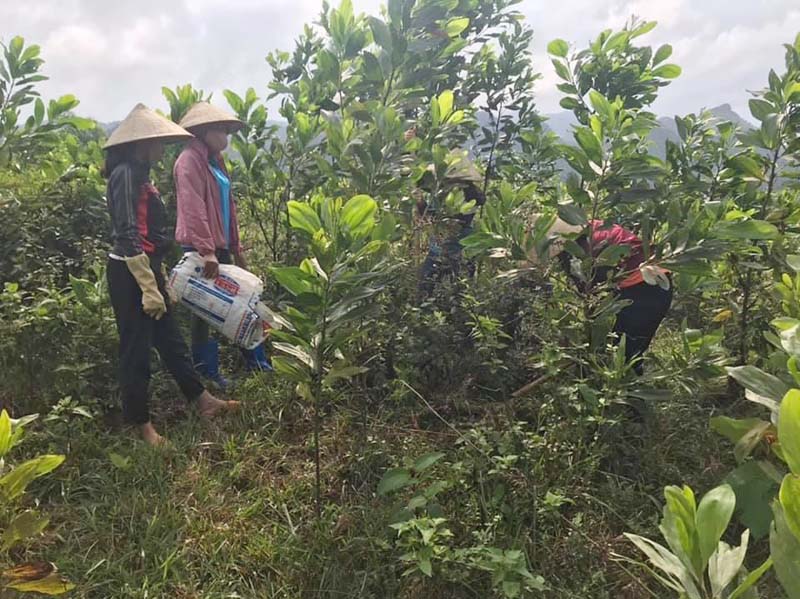



The members of the Women’s Union from Da hamlet, Tan My commune (Lac Son) have been contributing the working days to help the members with difficult circumstances to develop their economy.
In 2016, in Da hamlet there were 138 women aged 18 and over, but only 82 women joined the Union. The percentage of women participating in the Union’s activities at that time was only nearly 60%. The Executive Committee of the Union has always been struggling to find the most suitable solutions to attract women to participate in Unions’ activities. The Executive Committee of the Union actively met each member to learn and understand their thoughts, aspirations and wishes when joining the Union, and they set a target that by the end of the term 44 members would be admitted.
The Union has renewed the form and content of quarterly activities, the occasion of International Women's Day on 8 March, the major holidays ... by organizing many activities of cultural and entertaining exchange, exchanging experiences in many areas of life, creating a happy atmosphere for the women. They have been focusing on renovating the management methods, attracting the members through the use of the handbook created by the Head of the of the Provincial Women's Union, creating convenience in monitoring the members and searching information. In addition, the activities of visiting and helping the women in filial piety, joy and care for members' life are regularly carried out by the Union’s Executive Committee.
In the term 2016 - 2020, the Union organized 3 seminars, 5 exchanges of culture, sports and physical training, established 7 models of clubs, built a model of savings to contribute capital for building round walls. Thereby, it attracted 88 women to participate with the amount of 88 million VND, helping 40 households to build 8 km of round walls. From the trust fund of the Bank for Social Policy, 36 woman-members were allowed to borrow capital. At the same time, the Union mobilized to build the Union’s fund, allowing 30 members to borrow loans for the family’s economic development with the total amount of over 75 million dongs. The vocational training, job creation, propaganda and mobilization for the women to actively change the structure of plants and animals were paid attention to.
The main income of Ms. Bui Thi Hong's family from Da hamlet used to be mainly based on agricultural production. Most of the production land was used to grow maize, but it was not economical due to low purchasing costs. Since 2016, thanks to the propaganda of the Union’s Executive Committee, Ms. Hong has found a new direction to develop a sustainable family economy. She switched to growing high-yield cassava, all products have been contracted for consumption, and she does not have to worry about output as she used to. Up to now, the model of high-yield cassava has brought her family a stable income of over 100 million VND every year. Not only Ms. Hong, in the village, there are more and more examples of women earning a good income by actively converting crops and animals. They are as Ms. Bui Thi Bien (earning about 100 million VND / year), Ms. Bui Thi Diep (with the income of over 150 million / year) ...
Ms. Bui Thi Duong, the Head of the Women's Union of Da hamlet says: With the practical works of the Executive Board and the Union, the members, the women increasingly understand more about the Union’s organization, the most important thing is that they see their legitimate rights and interests when joining the Union. Thereby, the women have become more and more trusting, sticking, participating in the Union’s activities, having a sense of responsibility in the organization of the Union. Up to now, the Union has attracted the participation of 44 women, bringing the total number of women members to 126 people. The members of the Union are always united, helping each other in all fields, building a warm and happy family together.